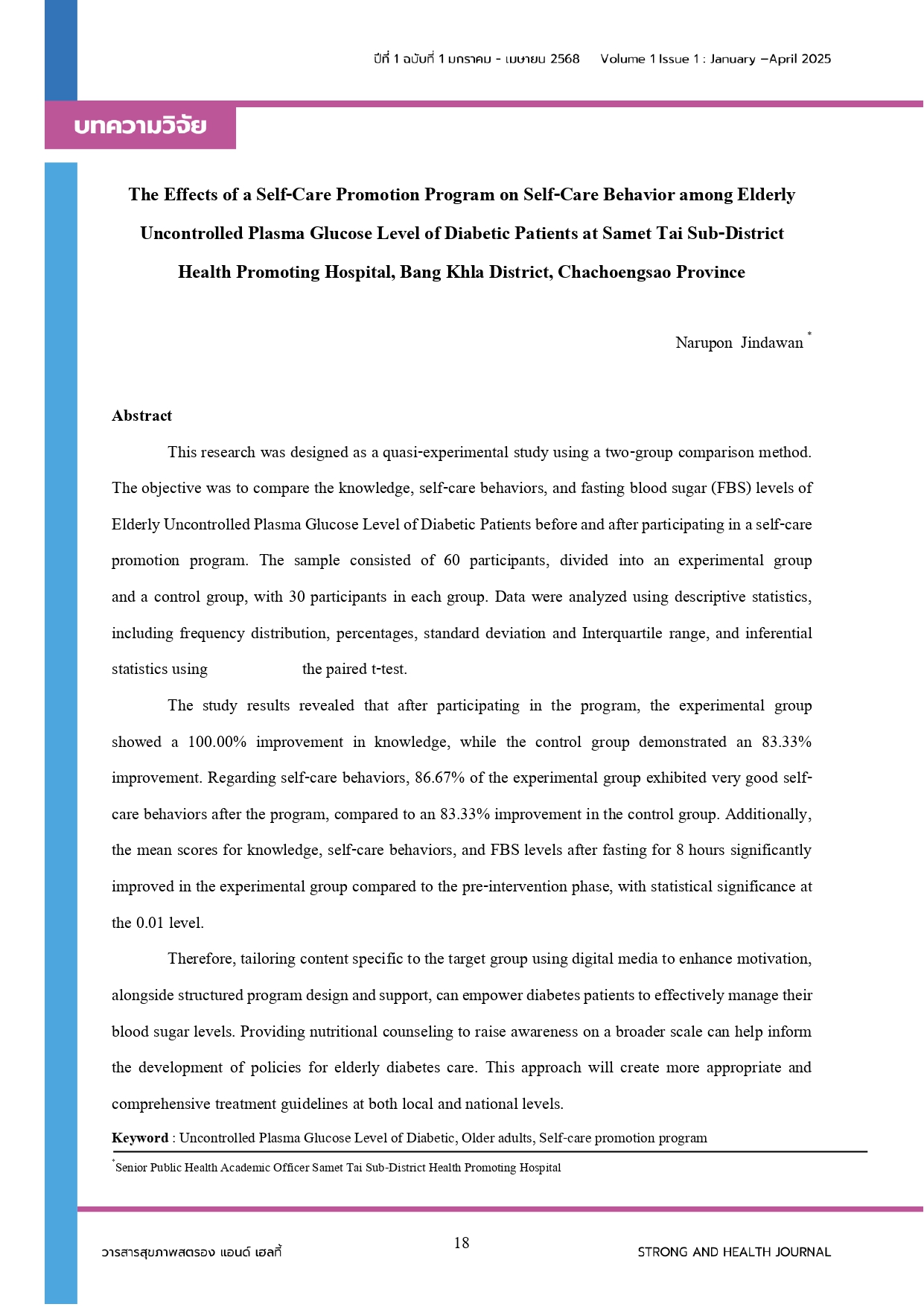The Effects of a Self-Care Promotion Program on Self-Care Behavior among Elderly Uncontrolled Plasma Glucose Level of Diabetic Patients at Samet Tai Sub-District Health Promoting Hospital, Bang Khla District, Chachoengsao Province
Main Article Content
Abstract
This research was designed as a quasi-experimental study using a two-group comparison method. The objective was to compare the knowledge, self-care behaviors, and fasting blood sugar (FBS) levels of Elderly Uncontrolled Plasma Glucose Level of Diabetic Patients before and after participating in a self-care promotion program. The sample consisted of 60 participants, divided into an experimental group and a control group, with 30 participants in each group. Data were analyzed using descriptive statistics, including frequency distribution, percentages, standard deviation and Interquartile range, and inferential statistics using the paired t-test.
The study results revealed that after participating in the program, the experimental group showed a 100.00% improvement in knowledge, while the control group demonstrated an 83.33% improvement. Regarding self-care behaviors, 86.67% of the experimental group exhibited very good self-care behaviors after the program, compared to an 83.33% improvement in the control group. Additionally, the mean scores for knowledge, self-care behaviors, and FBS levels after fasting for 8 hours significantly improved in the experimental group compared to the pre-intervention phase, with statistical significance at the 0.01 level.
Therefore, tailoring content specific to the target group using digital media to enhance motivation, alongside structured program design and support, can empower diabetes patients to effectively manage their blood sugar levels. Providing nutritional counseling to raise awareness on a broader scale can help inform the development of policies for elderly diabetes care. This approach will create more appropriate and comprehensive treatment guidelines at both local and national levels.
Article Details

This work is licensed under a Creative Commons Attribution-NonCommercial-NoDerivatives 4.0 International License.
References
American Diabetes Association. (2023). Classification and diagnosis of diabetes: Standards of medical care in diabetes—2023. Diabetes Care, 46(Supplement_1), S19–S40.
Hartmann, M., Kopf, S., Kircher, C., Faude-Lang, V., Djuric, Z., Augstein, F., ... & Friederich, H. C. (2012). Sustained effects of a mindfulness-based stress-reduction intervention in type 2 diabetic
patients: Design and first results of a randomized controlled trial (the Heidelberger Diabetes and Stress-study). Diabetes Care, 35(5), 945-947.
กรมควบคุมโรค. (2562). รายงานสถานการณ์โรค NCDs 2562 [อินเทอร์เน็ต]. [เข้าถึงเมื่อ 29 เมษายน
. เข้าถึงได้จาก: https://ddc.moph.go.th/uploads/publish /publish/103582020100507/3556.pdf
กรมควบคุมโรค. (2565). คู่มือแนวทางการดำเนินงาน NCD Clinic Plus [อินเทอร์เน็ต]. [เข้าถึงเมื่อ 29 เมษายน 2567]. เข้าถึงได้จาก: https://ddc.moph.go.th/uploads/publish/137692 230127075004.pdf
ดิเรก ขำแป้น. (2566). สถานการณ์โรคเบาหวานในประเทศไทย [อินเทอร์เน็ต]. [เข้าถึงเมื่อ 29 เมษายน 2567]. เข้าถึงได้จาก: https://www.thaipbs.or.th/news/content/333847
ปพิชญา พรมจันทร์. (2566). ผลของการเข้าโปรแกรมการจัดการตนเองของผู้ป่วยเบาหวานชนิดที่ 2 ที่ ควบคุมระดับน้ำตาลไม่ได้ ศูนย์สุขภาพชุมชนเมือง โรงพยาบาลมุกดาหาร [ออนไลน์]. โรงพยาบาล มุกดาหาร. [เข้าถึงเมื่อ 24 มิถุนายน 2567]. เข้าถึงได้จาก : https://mukhos.moph.go.th/media/
researchs/2023/10 /16/The_effect_of_....pdf
ระบบคลังข้อมูลด้านการแพทย์ Health Data Center (HDC). (2565). สถานการณ์โรคเบาหวาน [อินเทอร์เน็ต]. สำนักงานสาธารณสุขจังหวัดฉะเชิงเทรา. [เข้าถึงเมื่อ 29 เมษายน 2567]. เข้าถึงได้ จาก: https://cco.hdc.moph.go.th/hdc/reports/report.php?source=envocc/format1.php.
ระบบคลังข้อมูลทางวิชาการ BRU. (2566). แนวคิดเกี่ยวกับการส่งเสริมสุขภาพ [อินเทอร์เน็ต]. [เข้าถึงเมื่อ 29 เมษายน 2567]. เข้าถึงได้จาก:https://dspace.bru.ac.th/xmlui/bitstream/handle/123456789
วรางคณา บุตรศรี. (2564). ผลของโปรแกรมการให้ความรู้ต่อพฤติกรรมการดูแลตนเองและการควบคุม ระดับน้ำตาลในเลือดในผู้ป่วยเบาหวานชนิดที่ 2 ที่ควบคุมระดับน้ำตาลในเลือดไม่ได้. วารสารวิชาการ มหาวิทยาลัยการจัดการและเทคโนโลยีอีสเทิร์น, 18(1), 13-25.
ศรัณญา แก้วคำลา. (2563). ประสิทธิผลของกระบวนการกลุ่มต่อระดับน้ำตาลในเลือดของผู้ป่วยเบาหวาน คลินิกเบาหวานงานผู้ป่วยนอก โรงพยาบาลเสลภูมิ. วารสารโรงพยาบาลมหาสารคาม, 17(3), 179-184.
สาวิตรี นามพะธาย.(2561).ผลของโปรแกรมการจัดการโรคเบาหวานด้วยตนเองต่อพฤติกรรมการควบคุม ระดับน้ำตาลในเลือดและค่าน้ำตาลเฉลี่ยสะสมในเลือดของผู้ป่วยโรคเบาหวานชนิดที่ 2 ที่ควบคุม ไม่ได้.นครปฐม:คณะพยาบาลศาสตร์ มหาวิทยาลัยคริสเตียน.
อารมย์ อร่ามเมือง.(2566). ประสิทธิผลของโปรแกรมการส่งเสริมการดูแลตนเองต่อพฤติกรรมการดูแล ตนเองผู้สูงอายุที่ป่วยด้วยโรคเบาหวานชนิดที่ 2 ที่ศูนย์สุขภาพชุมชนกระดังงา อำเภอบางคนที จังหวัดสมุทรสงคราม. วารสารเพื่อการส่งเสริมสุขภาพและคุณภาพชีวิต, 3(1), 25-36.


